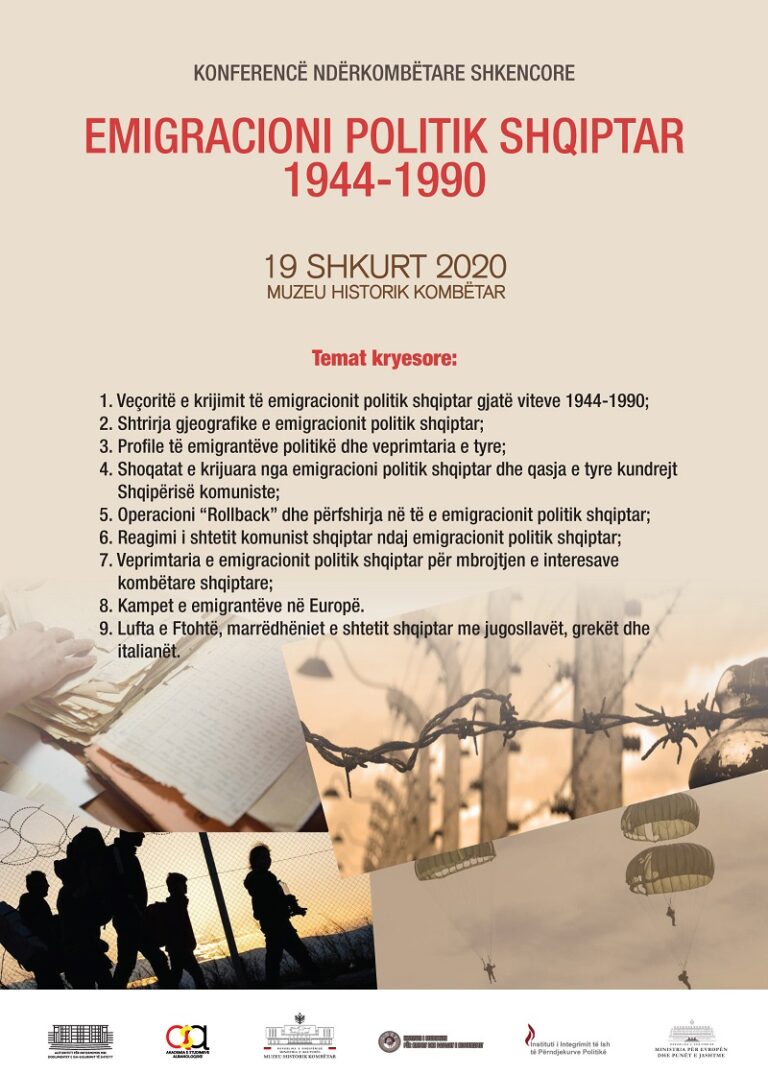Call for presentations for the International Scientific Conference:
Albanian Political Emigration in the Years 1944-1990
In the autumn of 1944, the city of Shkodër experienced large gatherings of people seeking means of transportation to leave Albania. Most of them were wealthy and educated Albanians who had held important positions in the administrations established by the Italian and German occupiers, as well as some leaders of the Balli Kombëtar, Legaliteti, and other political organizations formed during World War II in Albania.
The decisions of the Congress of Përmet and the Second Meeting of the General Anti-Fascist National Liberation Council had sealed the takeover of power by the Communist Party of Albania (PKSH) and, along with it, the direction Albania would take in the future. For these personalities, the only way to escape the revenge of the new rulers was to choose this path away from their homeland, which for many of them turned out to be irreversible. To this first wave of Albanian political emigration, many others were added over time, who were forced to leave the country to escape communist repression or because they refused to live behind the barbed wires imposed by the regime.
In Albania, the high-ranking leaders of the regime considered Albanian political emigrants as "traitors to the homeland" because of their stances during World War II; their involvement in numerous operations organized by foreign intelligence services; and their open opposition to the totalitarian regime established in Albania. In exile, many of them became prominent voices in academic and social life, continuously raising their voices against Albanian totalitarianism as well as advocating for the Albanian national cause. Letters and petitions from individuals or organizations of the Albanian political emigration were periodically sent to international institutions such as the UN, Amnesty International, the European Parliament, the U.S. Senate, and the Council of Europe, expressing concern over various issues related to Albania and Albanians.
Unfortunately, there are still no serious academic publications about the activities of the Albanian political emigration. To facilitate the encouragement of a healthy scientific debate about the activities and personalities of the Albanian political emigration during the years 1944-1990.
Authority for Information on the Files of the Former State Security and the Institute of History
at the Academy of Albanological Studies,
in cooperation with
the Institute for the Study of Crimes and Consequences of Communism and
the Institute for the Integration of Former Politically Persecuted Persons
They invite you to submit proposals for presentations on the following topics:
At the AIDSSH archive, a vast variety of archival documents are preserved and managed, containing and addressing information and data about Albanian political emigration, refugees abroad, sabotage groups, various political organizations created by the Albanian emigration in Europe, the United States of America, and other countries. These documents consist of reports, statistics, and information on the activities of the Albanian emigration in different countries; reports and accounts on sabotage gangs that mainly operated in Yugoslavia; reports and statistics on refugees; data and files on political and economic emigrants, etc.
The aforementioned documents are estimated to comprise approximately 90,000 files and folders and belong to the period 1944-1991. Most of these documents are expected to be made public for the first time to citizens and researchers.
Meanwhile, for the past year, the Authority has undertaken a project to collect oral testimonies of survivors of persecution, including the Albanian communities in the USA and Belgium. The agreement between AIDSSH and Voice of America, along with cooperation with the Pan-Albanian Federation Vatra, has enabled interviews with refugees in the United States who were persecuted by the State Security; their testimonies have been deposited in the Authority’s digital archive. The same project continues in Belgium, in collaboration with the Albanian community there. Representatives of these communities are invited to contribute to the conference.
The proposal should be in the form of an abstract, no more than 300 words, and must be submitted by November 15, 2019 to the email address: info@autoritetidosjeve.gov.al
Participants will be notified of their selection no later than November 22, 2019.
The conference will be held on the date of February 19, 2020.
Depending on applications, international participation, etc., it may be extended to 1 or 2 days.
Organizing Committee:
Dr. Marenglen Kasmi (AIDSSH)
Dr. Adriana Topi (AIDSSH)
Representative from the Institute of History/ASA
Representative from the Institute for the Study of Crimes and Consequences of Communism (ISKK)
Representative from the National Historical Museum (MHK)
Representative from the Archive of the Ministry of Foreign Affairs
